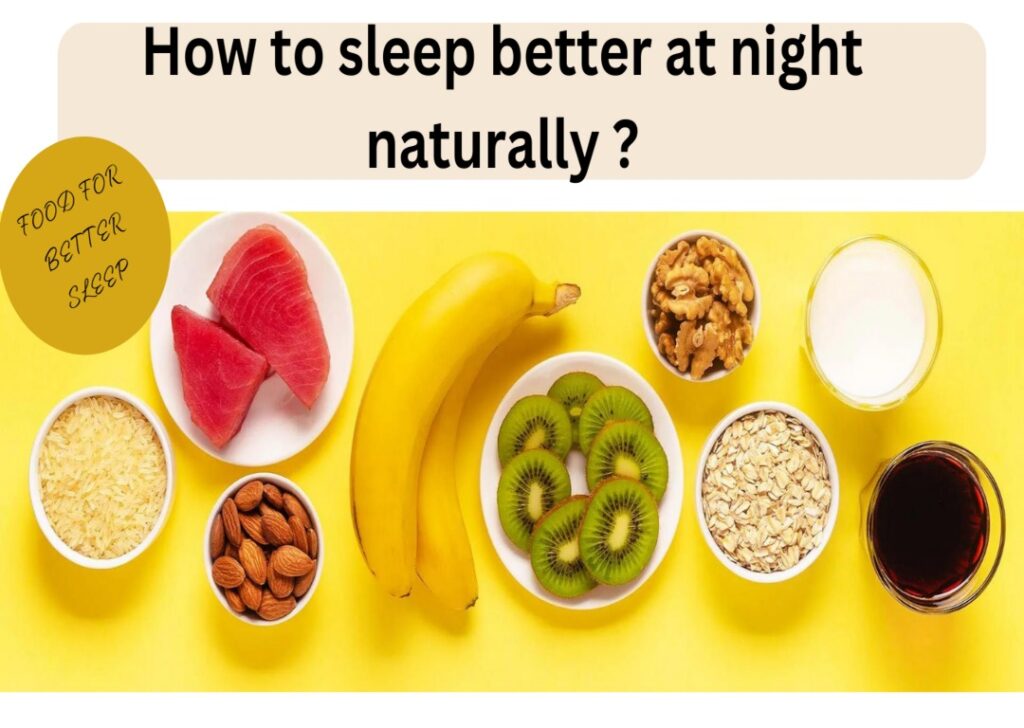In today’s fast-paced world, achieving a good night’s sleep has become a luxury rather than a necessity for many. With screens glowing late into the night and stressors abound, the art of natural sleep seems to be fading.
However, reclaiming this essential aspect of our well-being is not only possible but crucial for our overall health and vitality.
In this guide, we’ll explore various steps and dietary habits that can help facilitate natural sleep, delve into the importance of quality rest, and highlight the numerous benefits it brings to our lives.
How to sleep better at night naturally ? Understanding the Importance of Good Sleep:
Before diving into the practical steps, it’s essential to grasp why sleep is so crucial. Sleep is not merely a passive state of rest; it’s a dynamic process vital for our physical, mental, and emotional well-being.
During sleep, our bodies undergo repair, our brains consolidate memories, and our immune system strengthens. Lack of sleep has been linked to a myriad of health issues, including obesity, diabetes, heart disease, and impaired cognitive function.
Moreover, it can exacerbate mental health conditions such as anxiety and depression. Therefore, prioritizing good sleep is fundamental to leading a healthy and fulfilling life.
How to sleep better at night naturally ? Steps to Achieve Natural Sleep:
Establish a Consistent Sleep Schedule: Our bodies thrive on routine, so setting a consistent bedtime and wake-up time—even on weekends—helps regulate our internal clock, making it easier to fall asleep and wake up naturally.
Create a Relaxing Bedtime Ritual: Engage in calming activities before bed, such as reading a book, taking a warm bath, or practicing mindfulness meditation. These rituals signal to your body that it’s time to wind down, preparing you for a restful night’s sleep.
Optimize Your Sleep Environment: Make your bedroom conducive to sleep by keeping it dark, quiet, and cool. Invest in a comfortable mattress and pillows, and consider using blackout curtains or white noise machines to block out any disturbances.
Limit Screen Time Before Bed: The blue light emitted by screens can disrupt our sleep-wake cycle by suppressing the production of melatonin, the hormone that regulates sleep. Aim to power down electronic devices at least an hour before bedtime to allow your brain to unwind naturally.
Watch Your Caffeine Intake: While a cup of coffee can provide a much-needed boost during the day, consuming caffeine late in the afternoon or evening can interfere with your ability to fall asleep. Limit caffeine intake after midday, and opt for herbal teas or decaffeinated beverages instead.
How to sleep better at night naturally ? Foods That Facilitate Good Sleep:

How to sleep better at night naturally ? Tart Cherries: Rich in melatonin, tart cherries can naturally promote sleep and regulate your internal clock. Enjoy a serving of tart cherry juice or a handful of fresh cherries as a pre-bedtime snack.
How to sleep better at night naturally ? Bananas: Bananas are a great source of magnesium and potassium, both of which help relax muscles and nerves, making it easier to drift off to sleep. Plus, they contain tryptophan, an amino acid that gets converted into serotonin and melatonin in the body.
How to sleep better at night naturally ? Almonds: Almonds are packed with magnesium, which plays a key role in regulating sleep quality. Snack on a handful of almonds before bed to promote relaxation and enhance sleep.
How to sleep better at night naturally ? Herbal Teas: Chamomile, valerian root, and lavender teas are renowned for their calming properties and can help soothe your mind and body before bedtime. Brew yourself a warm cup of herbal tea as part of your nightly wind-down routine.
How to sleep better at night naturally ? Benefits of Natural Sleep:
Improved Cognitive Function: Quality sleep is essential for cognitive processes such as memory consolidation, problem-solving, and decision-making. By getting enough restorative sleep, you’ll wake up feeling sharper, more focused, and mentally alert.
Enhanced Mood and Emotional Well-being: Sleep and mood are intricately linked, with insufficient sleep being closely associated with irritability, mood swings, and increased stress levels. Prioritizing good sleep can help stabilize your mood, reduce anxiety, and promote emotional resilience.
Strengthened Immune System: During sleep, your body produces cytokines, proteins that play a crucial role in immune function. By getting adequate sleep, you’re giving your immune system the support it needs to fend off infections and stay healthy.
Increased Energy and Vitality: When you consistently get good-quality sleep, you’ll notice a significant boost in your energy levels and overall vitality. You’ll feel more motivated, productive, and ready to tackle the day ahead with enthusiasm.
Conclusion: How to sleep better at night naturally ?
In a world where sleep deprivation has become all too common, prioritizing natural sleep is a powerful act of self-care.
By incorporating healthy sleep habits, mindful eating, and relaxation techniques into your daily routine, you can reclaim the restorative power of sleep and experience its myriad benefits firsthand.
Remember, sleep is not a luxury; it’s a necessity for thriving in every aspect of your life. So tonight, embrace the tranquility of natural sleep and awaken to a brighter, more vibrant tomorrow.
Why is sleep important for overall health?
Sleep plays a crucial role in physical, mental, and emotional well-being. It allows the body to repair and regenerate tissues, consolidates memories, regulates hormones, and supports immune function.
How much sleep do I need each night?
The recommended amount of sleep varies by age, with adults generally needing 7-9 hours per night. However, individual sleep needs may vary, so it’s essential to listen to your body and prioritize getting enough rest to feel refreshed and alert during the day.
What are some common sleep disorders, and how can they be treated?
Common sleep disorders include insomnia, sleep apnea, restless legs syndrome, and narcolepsy, among others. Treatment options vary depending on the specific disorder but may include lifestyle changes, therapy, medication, or medical devices such as CPAP machines for sleep apnea.
How can I improve my sleep quality naturally?
You can improve sleep quality naturally by adopting healthy sleep habits, such as maintaining a consistent sleep schedule, creating a relaxing bedtime routine, optimizing your sleep environment, limiting caffeine and screen time before bed, and managing stress through relaxation techniques like meditation or deep breathing exercises.
Are there any foods or drinks that can help promote better sleep?
Yes, certain foods and drinks contain nutrients or compounds that may promote better sleep, such as tart cherries (a natural source of melatonin), bananas (rich in magnesium and potassium), almonds (high in magnesium), and herbal teas like chamomile or valerian root.
What lifestyle factors can negatively impact sleep quality?
Lifestyle factors that can negatively impact sleep quality include irregular sleep schedules, excessive screen time before bed, consuming caffeine or alcohol close to bedtime, lack of physical activity, and high levels of stress or anxiety.
When should I seek help for persistent sleep problems?
If you experience persistent sleep problems despite making lifestyle changes or if your sleep disturbances significantly impact your daily functioning and quality of life, it’s essential to consult with a healthcare professional. They can help identify any underlying issues and recommend appropriate treatment options.
What are the potential consequences of chronic sleep deprivation?
Chronic sleep deprivation can have serious consequences for both physical and mental health, including increased risk of obesity, diabetes, heart disease, weakened immune function, cognitive impairment, mood disorders, and decreased overall quality of life.
Can technology or gadgets help improve sleep quality?
While technology and gadgets such as sleep trackers or white noise machines may be helpful for some individuals, it’s essential to use them as tools in conjunction with healthy sleep habits rather than relying solely on technology to improve sleep quality. Additionally, minimizing screen time before bed is crucial for reducing sleep disturbances caused by blue light exposure.
What are some relaxation techniques that can help promote better sleep?
Relaxation techniques such as deep breathing exercises, progressive muscle relaxation, guided imagery, and mindfulness meditation can help calm the mind and body, making it easier to fall asleep and stay asleep naturally. Integrating these techniques into your bedtime routine can promote relaxation and improve sleep quality over time.




